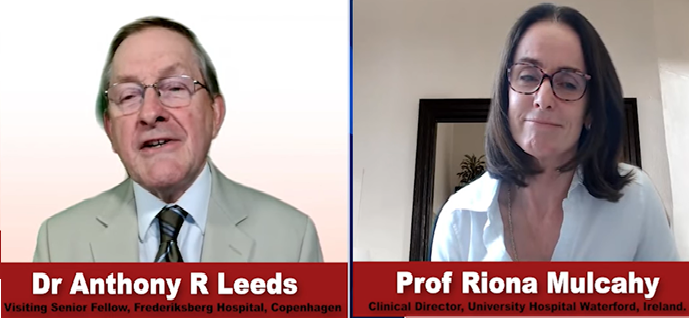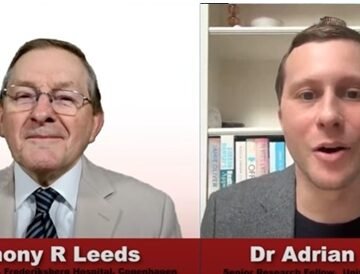Health chat with Dr Anthony R Leeds
Title: Brain health, dementia and risk reduction
Prof Riona Mulcahy, Clinical Director, University Hospital Waterford, Ireland.
Health chat with Dr Anthony R Leeds
Title: ‘Brain health, dementia and risk reduction’
Prof Riona Mulcahy, Clinical Director, University Hospital Waterford, Ireland.
In episode 4 in this series (released 28th June) Professor John Nolan described how his work on eye health evolved to address the effect of nutrition supplementation on brain function. He described the evidence for use of the same carotenoid supplements as used to slow progression of macular degeneration, given with vitamin E and omega-3 fatty acid supplementation. The most recent experimental work has shown benefit in improved memory and brain function, opening up the possibility of such supplementation improving some aspects of brain function in dementia.
In this episode Professor Riona Mulcahy, the senior care of the elderly physician who worked with the research team at South-East Technology University, describes the nature of dementia, its characteristics and options for prevention and management.
Dementia is an over-arching term that covers many conditions including Alzheimer’s disease, in which memory impairment, difficulties with the tasks of daily living, difficulty with speech and communication and disorientation in time and space, develop gradually due to several possible underlying causes.
Age and genetic factors are major determinants of risk which cannot be changed but there are several that can be addressed. Being physically and socially active, following a healthy diet, and ‘challenging your brain’ are good preventive strategies. Making safe choices is also good: stop smoking, reduce high alcohol intake, address hearing loss and avoid head injuries. Several national societies offer good guidance on these approaches, see for example: Click here
With an ageing global population and rising numbers of people already affected by dementia of various types, it will become even more important to detect those affected early be recognizing the early warning signs and then offering appropriate interventions both lifestyle and medical, see at this link :
Prof Mulcahy describes the work done in Waterford and sets it in the context of our current understanding of how to detect dementia in its early stages and how its progression can be slowed down by diet and lifestyle changes and how modern medicines, though expensive, can contribute to its management. The work undertaken in the Republic of Ireland needs to be replicated in other countries with studies on larger numbers of people run for longer periods of time, but the findings from Waterford provide encouraging evidence for use of a safe, effective antioxidant food supplement to help address this devastating condition.
Links to other useful sources are given below:
World Health Organization;
Global-action-plan-on-the-public-health-response-to-dementia-2017-2025
Towards a dementia plan: a WHO guide
Pakistan
Dementia-types
India
Dementia-alzheimers
Malaysia
Risk-factors-and-prevention
Singapore
Dementia
United Kingdom
What-is-dementia
About Dementia
Reduce-your-risk-of-dementia
What-is-dementia
USA
Alzheimers
Healthy-body-brain
Alzheimer_s_dementia
Causes-and-risk-factors
Alzheimers-dementia/10_signs
Canada
Alzheimer.ca
10-warning-signs-dementia
Brain-healthy-tips-reduce-your-risk-dementia
–ooOOoo–



![Long term benefits of obesity surgery [part 2] Mr Pratik Sufi](https://bittertruth.uk/wp-content/uploads/2025/06/sufi-360x280.jpg)




















